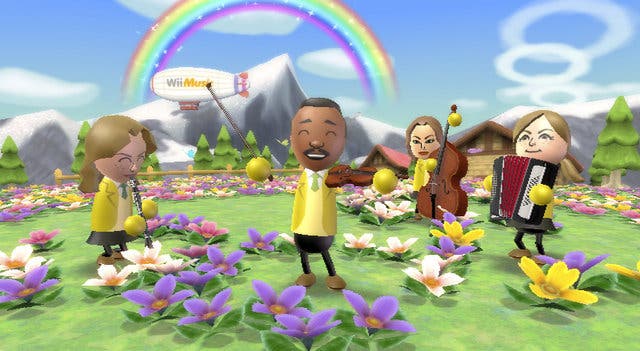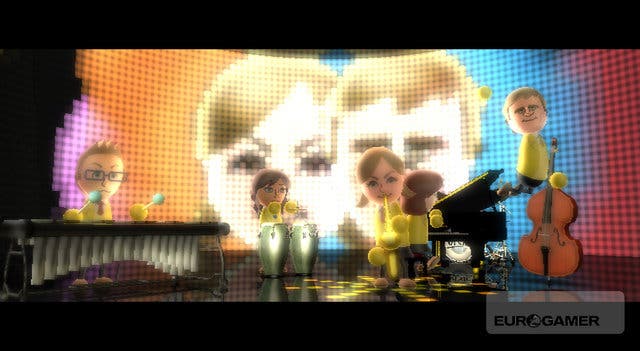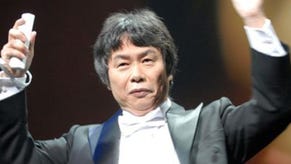Wii Music
Out of tune.
There has already been plenty of debate about Wii Music. Some say it's another bold move by Nintendo to explore the wider uses of console technology and expand the gaming demographic. Some say it's another sign Nintendo is abandoning its hardcore fanbase in order to pursue a more lucrative agenda. Others say fcuk u in ur stupid ass Nintendo Wii Music sux ballz i want teh realz next gen.
But most of the debate has been about what Wii Music actually is. Is it a videogame? Is it a toy? Is it a creative tool? Is it a learning device? The answer is, it's attempting to be all of those things. The bad news is, it's not very good at being any of them.
Let's start with the basics. Wii Music features more than 60 virtual instruments, ranging from the obvious (drums, guitars, pianos, string instruments etc.) to the more obscure (sitars, banjos, DJ turntables) and the downright silly (dog and cat noises).
Each instrument is played using one of four control systems. The Piano method involves waving the remote and nunchuk up and down as if banging away on a keyboard. To play Guitar-style instruments you hold the nunchuk as if it were the neck, and make a strumming motion with the remote. The nunchuk also represents the neck when using the Violin method, and the remote is used as a bow.
In Trumpet mode, you hold the remote as if it were a wind instrument and press the 1 and 2 buttons to make sounds, raising or lowering the controller to increase or decrease the volume. You can also press buttons while using the other playing styles to produce different effects such as tremelo, glissando and arpeggio, but this isn't obligatory.
In fact, nothing in Wii Music is obligatory - you don't even have to worry about playing the right notes or keeping to the rhythm. Songs will sound better if you bang away in time, but there's no scoring system so no penalties. You even get to award yourself points after each song according to how well you think you did.

In this respect, Wii Music is very different to traditional videogames. But while there are no penalties, there is a reward system; new tracks, environments and instruments are unlocked by completing lessons and recording videos.
Game modes include 'Quick Jam', where a song, part and instrument are chosen for you, or a 'Custom Jam'. Here you can choose whether to play the melody, harmony, chord, bass or percussion parts. There are 50 songs to unlock, including classical pieces (Ode to Joy, Four Seasons), nursery rhymes (Twinkle Twinkle Little Star, My Grandfather's Clock), "as made famous by" pop hits (Every Breath You Take, Wake Me Up Before You Go-Go) and Nintendo theme tunes (F-Zero, Zelda, Super Mario Bros.).
There is some fun to be had with picking your song and instrument, changing the tempo and trying out different musical styles. I enjoyed beatboxing over a super-fast classical version of Material Girl, for example. For about three minutes. If you're really dedicated you can play through the song again and again, recording each part yourself. But this takes time and frankly, the novelty doesn't last that long.
It's this aspect of Wii Music, the ability to play with different instruments and experiment with combinations, that makes it feel like a toy. But does it have any value as a musical tool? To help answer that question I got some help from a couple of people who know about this sort of thing. First up was Clarissa, who has a degree in music and plays the cello in a band. After a few hours of play, she said, "Wii Music teaches you about rhythm, because you need to play the right rhythm for the tune to come out as you need to hear it.

"It encourages creativity and improvisation, in that you can just decide to play in the way you want to. It doesn't tell you you're doing it wrong, which is where other musical games, like Guitar Hero and SingStar, are lacking. But you're not ever really making your own tunes up, it's pre-set."
To get a second opinion I enlisted the help of Jake, a professional composer and occasional contributor to Eurogamer. He agreed that there are serious constraints when it comes to exploring your own creativity. "There's freedom of expression, but it's not your expression," he said. "It's an expression of the music algorithm that's been programmed into the thing... It's quite primitive."



